|
|
|
Sort Order |
|
|
|
Items / Page
|
|
|
|
|
|
|
| Srl | Item |
| 1 |
ID:
172617


|
|
|
|
|
| Summary/Abstract |
he author presents her view on one of the most important events in the history of China in the first half of the 20th century, 1919's May Fourth movement. The reasons for and consequences of this movement against the backdrop of the New Culture movement (1915-1925) are considered in light of the effect the ideas of Westernization had on China, and the experience of the 1917 October Revolution in Russia. The relationship between domestic events and foreign influences on China is demonstrated. History shows it was a turning point in the life of Chinese society and called the future path of the country's development into question. Contemporary assessments of the New Culture movement and 1919's May Fourth movement revise and supplement existing ideas on the reasons for and content of the latter.
|
|
|
|
|
|
|
|
|
|
|
|
|
|
|
|
| 2 |
ID:
060257


|
|
|
| 3 |
ID:
085890


|
|
|
|
|
| Publication |
2008.
|
| Summary/Abstract |
The historiography of Malay cultural production has a number of blind spots. In the case of the stamboel theatre and its related forms, this article addresses three of them: first, the transformation process from popular performing traditions to modern Westernized theatre, with a focus on individualization and intellectualization; second, the generally underrated or even negated contribution of Sino-Malay intellectuals/artists to that process; and third, the productive interweaving of the modern media of film, theatre and literature. The theoretical concept of the dispositif, in tandem with two concrete case studies - the highly successful stamboel ensembles Miss Riboet and Dardanell - will help circumscribe the adjustments required in the modernization process. Within this framework, the relevance of situational elements and the technical apparatus, altering modes of perception, the cultural phenomenon of stardom and the negotiation between oral stage productions and printed play scripts are discussed. All these aspects are brought together in a contextualization and evaluation of the early forms of modern Malay theatre and its contribution to the development of modern Indonesian culture.
|
|
|
|
|
|
|
|
|
|
|
|
|
|
|
|
| 4 |
ID:
187539
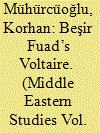

|
|
|
|
|
| Summary/Abstract |
Beşir Fuad (1852?-1887) is an obscure figure among late nineteenth century Ottoman intellectuals known for his materialistic views which were unprecedented under the Hamidian regime (1876-1909) and who shocked his contemporaries by committing suicide at an early age, leaving a note and a letter containing his last impressions and world view. Just months before his suicide, Beşir Fuad published a Voltaire biography in which he commemorates him as an Enlightenment ideal to be emulated in humankind’s struggle against religious intolerance. In this article, Beşir Fuad’s Voltaire (1886) is examined, arguing that the monograph was, though in an embryonic form, an early expression and defence of individual liberty, based on a materialistic world view that aims at demystification of the prevailing customs and morals as irrational and superstitious absurdities to pave the way for a future society in which the individual would be in liberty.
|
|
|
|
|
|
|
|
|
|
|
|
|
|
|
|
| 5 |
ID:
122362
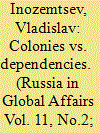

|
|
|
|
|
| Publication |
2013.
|
| Summary/Abstract |
It would be more logical to recognize only settler colonies as colonies per se and refer to all other results of expansion as dependencies. The loss of colonies is incomparably more dangerous for empires than the loss of dependencies. Trying to hold on to dependencies is meaningless, but to neglect the colonies is reckless.
|
|
|
|
|
|
|
|
|
|
|
|
|
|
|
|
| 6 |
ID:
139732
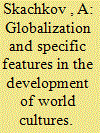

|
|
|
|
|
| Summary/Abstract |
FEW PEOPLE would presently question self-importance of a cultural factor in world politics. One could easily agree with the British political scientist A. Hopkins who held that culture has always been impacting global processes, despite the fact that researchers have long been giving preference to politics and the economy over culture when evaluating global phenomena.
|
|
|
|
|
|
|
|
|
|
|
|
|
|
|
|
| 7 |
ID:
084819


|
|
|
| 8 |
ID:
181091
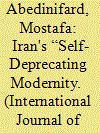

|
|
|
|
|
| Summary/Abstract |
Extant studies of Iranian nationalism accentuate the self-aggrandizing side of Iranian modernity, mainly achieved through, and informing, a process of otherizing certain non-Persians/Iranians, particularly the Arabs. I argue that equally important to understanding Iranian modernity is its lesser recognized, shameful and self-demeaning face, as manifested through a simultaneous 19th-century discourse, which I call “self-deprecating modernity.” This was an often self-ridiculing and shame-inducing, sometimes satirical, discourse featuring an emotion-driven and self-Orientalizing framework that developed out of many mid-nineteenth-century Iranian modernists’ obsessions with Europe's gaze; with self-surveillance; and with the perceived humiliation of Iranians through the ridiculing laughter of Other (especially European) nations at Iran's and Iranians’ expense. To explore this discourse, I re-examine the works of three pre-constitutionalist thinkers and writers within the broader sociopolitical context of late Qajar Iran, surveying their perspectives on shame, embarrassment, and ridiculing laughter, and showing how they were significantly informed by, while also helping to form, self-deprecating modernity. Given the strong, self-colonizing presumptions of this discourse, I conclude the article with a stress on the importance of re-exploring collective self-critical practices in modern Iranian history, culture, and literature with an eye toward decolonizing self-criticism.
|
|
|
|
|
|
|
|
|
|
|
|
|
|
|
|
| 9 |
ID:
093660
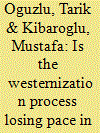

|
|
|
|
|
| Publication |
2009.
|
| Summary/Abstract |
The logic of interest, which has gained considerable ground in foreign policy formulation in Turkey, is not rooted in Western identity, nor is it contingent upon the degree of interaction exclusively with the Western world. The entire world has equal prominence in Turkey's foreign policy orientation. Whether the prevalence of the logic of interest in the formulation of Turkish foreign policy under the "post-Islamist" AKP government signifies a deviation from the Westernization process or whether it is simply a reaction to the conjunctural developments in the international arena in order to preserve Turkey's national interests is seriously debated. This paper aims to contribute to this debate by shedding light on the background of developments both inside and outside Turkey.
|
|
|
|
|
|
|
|
|
|
|
|
|
|
|
|
| 10 |
ID:
086713
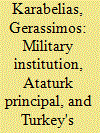

|
|
|
|
|
| Publication |
2009.
|
| Summary/Abstract |
Mustafa Kemal Ataturk principles expressed the desire of the Turkish military-bureaucratic elite to create a strong, modern, western-like state. But, the process of modernization through westernization was supposed to transform the politically meaningless subjects of the Ottoman Empire (the rea'ya) into citizens - a politically meaningful category. Lack of trust over people's preferences and the military's tutelary role under the pretext of the eternal leaders' principles has turned Turkey's quest for democracy into another Sisyphean enterprise.
|
|
|
|
|
|
|
|
|
|
|
|
|
|
|
|
| 11 |
ID:
126213
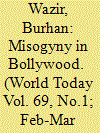

|
|
|
|
|
| Publication |
2013.
|
| Summary/Abstract |
The rape and killing of a student had led to criticism of the portrayal of women in films.
|
|
|
|
|
|
|
|
|
|
|
|
|
|
|
|
| 12 |
ID:
113610
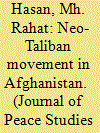

|
|
|
| 13 |
ID:
153592


|
|
|
|
|
| Summary/Abstract |
The main objective of this article is to understand the ways in which the köçek (dancing boys) performance became a source of shame and how the practice was subjected to a number of bans in Ottoman Istanbul. In the literature on the köçek, there is a general trend that argues that the practice was banned because of the fights, quarrels and other disputes related to the köçeks and that the practice disappeared altogether no later than 1856. This is what I call the ‘social disorders argument’ and while I acknowledge that history and examine some evidence of social disorders associated with the dancing boys, I also re-analyse the disorders arising from a powerful homoerotic desire that was so common as to even be normative in certain circles in the Ottoman era. In this article, through historical evidence, I show that there are a number of proscriptions against the köçeks. Through a brief history of the bans from the sixteenth century onwards, I show the ways in which the mentality of the bans changed during the Westernization/modernization period and how shame from homoeroticism became a significant determinant in the bans of the nineteenth century.
|
|
|
|
|
|
|
|
|
|
|
|
|
|
|
|
| 14 |
ID:
115049


|
|
|
|
|
| Publication |
2012.
|
| Summary/Abstract |
Westernization is a pervasive modern phenomenon. Its impact is more pervasive and pernicious than many people are aware and/or willing to admit. The spread of the dominant Western culture has caused a gradual demise of many peripheral cultures. The incursion of Western agents into Naga soil, beginning with British military conquest and American missionary intrusion, has resulted in a significant influence and westernization of Nagas and their culture and worldview. Consequently, it is almost a cliché to assert that since colonial contact the long-evolved Naga traditional values are being replaced by Western values. Today, the literal colonization of Nagas by the imperial West has ended, but the process of westernization is continuing, thanks to the ongoing influence being exerted by modern media, technology and other trends of globalization. My objective in this paper is not to highlight the 'form' or 'material' aspect of the culture, such as clothing (although mimicry in this area is almost faultless among a large section of Nagas), rather, my goal is to discuss the current state of mindset and fundamental cultural structures of the Nagas that have resulted from the adjustments in the lives and minds of the people because of the imposition of westernization. In fact, it is more than merely a process of adjustment consequent upon conquest, it is an extensive overhauling of cultural institutions, values and practices. I will underscore the westernization of some basic social structures and the mindset of the people.
|
|
|
|
|
|
|
|
|
|
|
|
|
|
|
|
| 15 |
ID:
060506


|
|
|
| 16 |
ID:
062070


|
|
|
|
|
| Publication |
Chicago, Holt, Rinehart and Winston, Inc., 1971.
|
| Description |
xi, 254p.Pbk
|
| Standard Number |
030841399
|
|
|
|
|
|
|
|
|
|
|
|
Copies: C:1/I:0,R:0,Q:0
Circulation
| Accession# | Call# | Current Location | Status | Policy | Location |
| 011111 | 947/WRE 011111 | Main | On Shelf | General | |
|
|
|
|
| 17 |
ID:
113883


|
|
|
|
|
| Publication |
2012.
|
| Summary/Abstract |
The publication in 1869 of Mill's Subjection of Women gave rise to philosophical and political responses beyond Western Europe on the relationship between Westernization and women's rights in developing, colonial, and post-colonial countries. Through the first comparative study of the Subjection of Women alongside the forewords to six of its earliest non-Western European editions, we explore how this book provoked local intellectuals in Russia, Chile, and India to engage its liberal utilitarian, imperial, Orientalist, and feminist ideas. By showing how Mill's Western European biases and instrumental reasoning establish problematic rhetorical models for women's rights arguments, we are able to explore the ethical dimensions of women's rights issues in the context of cultural and political imperialism. Most importantly, this reception history illustrates how cross-cultural and culturally sensitive dialogue on women's rights can push us beyond Western bias and imperialism in advocating for the end of women's subjection around the globe.
|
|
|
|
|
|
|
|
|
|
|
|
|
|
|
|
|
|
|
|
|